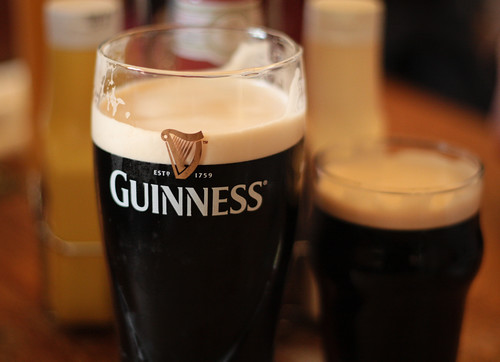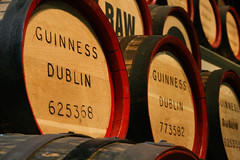The greening of Guinness

Posted March 16, 2012 at 2:01PM
Guinness Stout is one of the world’s great beverages. It is the darkest of beers, as hearty and full-bodied as they come, with a characteristic cream-colored head on top. Its color is black with, to my eyes, a hint of dark chocolaty brown. It’s been brewed in Ireland for the better part of three centuries and may it never change.
Now, perhaps there’s even more reason to love Guinness because, while its visual impression is dark, its metaphorical color is showing signs of green as the company adopts good environmental practices. “Sustainability and enhancing the environment of the Dublin communities has been a core philosophy of the Guinness Company since it was founded,” said Paul Carty, Managing Director at the Guinness Storehouse, the brewery’s large and historic facility at St. James’s Gate in the Irish capital. Last year the Storehouse, now a major tourist attraction hosting a million visitors annually, received a three-star accreditation from Sustainable Travel International for its environmental commitment. (The actual brewing was moved from the old facility in 1988.)
Among the highlights recognized by the award are these:
- Adoption of environmental performance indicators
- Measures to reduce waste, chemical use, and energy consumption
- Use of paper products derived from sustainably managed forests
- Advanced lighting technology
- Local food sourcing
- Locally sourced construction materials
- Sustainability training for staff
In the first video below, a company spokesperson says that, regarding food, the company works with Good Food Ireland, which according to its own website “was founded to endorse and promote . . . places committed to local food and to link the food producer, farmer and fisherman with the hospitality sector.”
Sustainable Travel International summarizes a number of criteria used to judge whether companies qualify for certification. In addition to performance regarding the environment, applicants are evaluated on social and cultural impacts, economic impacts, and “innovative best practices.” Companies must have a “written policy incorporating relevant criteria under each principle category below appropriate to the location, nature and scale of [their] operations.” Environmental factors include the following:
“Performance areas include but are not limited to: Ecosystem Preservation (e.g., transportation, endangered species, group size), Pollution Prevention (e.g., air, noise, vehicle maintenance), Energy Management (e.g., carbon management and offsets, business travel, client excursions), Waste Management (e.g., reduction of materials, recycling, supply chain management) Water Management (e.g., reduced consumption, waste water, non-point source pollution), and Chemical Management (e.g., cleaning supplies, paint, pesticides).”
Notably, ratings carry an expiration date, presumably requiring subsequent evaluations to maintain a good rating.
As a lover of the Guinness product, I have always been struck by the fact that it simply tastes better in Ireland. I didn’t realize there was an actual difference in the domestic and export versions, though, until I came across an article by Nicola Twilley on the Good website. It’s apparently a bit complicated, but stout beers such as Guinness require on-site infusion with nitrogen bubbles. If you’ve bought cans of the brew in the US, you may have noticed the plastic widget inside. It contains pressurized nitrogen, which is released when the can is opened (so don’t pour it too quickly or the widget won’t have time to work its magic). Anyway, Twilley reports that researchers at the University of Limerick have figured out a way to get the same result without the plastic widget, which should reduce waste once the new method is production-ready.
So that black beer might soon get greener still.
We Americans tend to think about things Irish and green on and around Saint Patrick’s Day, of course. Now, I know some people are intimidated by a perceived heaviness to Guinness. For you, I recommend Smithwick’s, a yummy amber ale that has gotten a bit easier to find in the US lately. Either way, now’s the time, and I’m stocked up. How about you?
I’ll leave you with two videos pertinent to the story and the occasion, respectively. First, here’s a look inside the Guinness Storehouse and their environmental practices:
And second, here are County Galway’s own Saw Doctors, Kaid’s favorite Irish roots-rock band, singing hearty and well about their home turf:
Related articles:
- A sustainable community in County Galway (March 17, 2011)
- Why we do this: a musical tribute to the Irish landscape (March 17, 2010)
- Ireland’s eco-village at Cloughjordan (March 17, 2009)
Move your cursor over the images for credit information.



